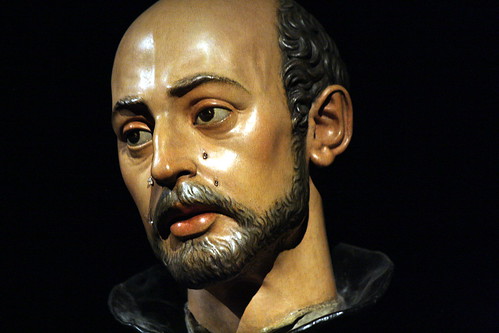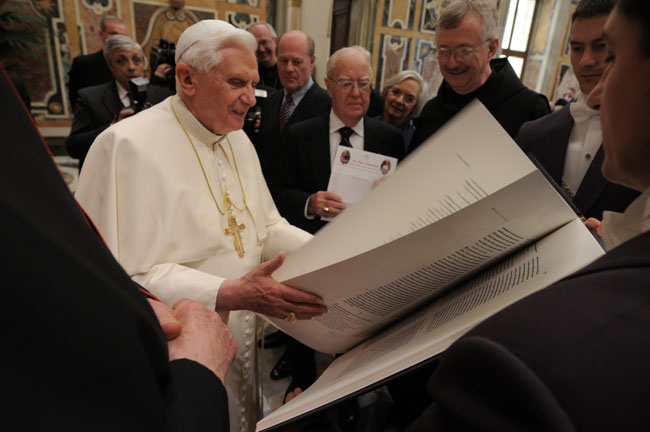![[graphic]](http://books.google.com/books?id=w-oCAAAAQAAJ&output=text&pg=PA68&img=1&zoom=3&hl=en&q=levitating+St.+Ignatius+glowing&cds=1&sig=ACfU3U0ncOUqUR1Xzuqqt0pmsoPO3fpoMA&edge=0&edge=stretch&w=211&h=338&ci=85,221,524,841) |
| ST. IGNATIUS IN RAPTURE AT HOLY MASS. |
A.d. 1550.
Until the sixteenth century all Christian people over the world were united in the one true faith and in the belief of the glorious presence of our Lord Jesus Christ in the Blessed Eucharist. The Most Holy Sacrament of the Altar was the Life, the Light, and the Strength of the Church and of all her children. True that in the eleventh century
Berengarius attempted to deny this great mystery; but as an
ignis fatuus the heresy disappeared, and the Catholic faith became only the more solidly and firmly rooted in the hearts of the faithful. From that time spread mightily the solemnity of Corpus Christi till it was celebrated throughout the world and by the entire Church.
But Almighty God, in the mystery of His counsels, permitted the Catholic unity to be violated in that unhappy sixteenth century, and in the heart of Germany arose the heresies which were to separate millions upon millions of the children of the Church from participation in the Most Adorable Eucharist, and thus estrange them from the most loving Heart of Jesus. Nevertheless, at that very time when
Lutheranism and
Calvinism and the innumerable forms of Protestantism of which these have been the parents seemed about to extinguish the love of God in the Blessed Sacrament, it pleased God to raise up a body of men whose souls should be fired with a yet more
glowing love for Him, and who should rekindle in the hearts of men the love of Jesus in the Blessed Sacrament.
St. Ignatius Loyola was born in Spain at the Castle of Loyola. In early years his ambition was to be great as a soldier, but he learned the will of God concerning his vocation before he had attained the height of his career. He was wounded at the siege of Pampeluna, and his recovery being slow he desired to read all he could of the noble deeds of knighthood; such books, however, were not within reach, and the Lives of the Saints were brought instead, in order to beguile the tedium of his convalescence. In these he found the source of true honour and glory, and the worldly fetters which chained him broke away. He devoted himself to God, and became the founder of the Company of Jesus.
When St. Ignatius and his companions were ordained, Ignatius resolved to pass a year iu preparation for the celebration ol his first Mass; and ,when this time had expired he still deferred the awful solemnity from month to month. At length, at the end of eighteen months,
on the feast of Christmas, in the chapel of the Crib of the Infant Jesus, he offered himself in union with this spotless sacrifice, as a freewill offering to the service of God. Two years afterwards he received from Pope Paul III. the ratification of his Society, and he was chosen by his companions as their first general.
St. Ignatius had learned by his own experience the marvellous effects of worthy communion.
He required at the least an hour for the celebration of his Mass, and frequently being in a rapture he would occupy a much longer time at the Most Holy Sacrifice.
Father Nicholas Lannoy, who on one occasion was present at his Mass, observed at the
Memento that a flame of fire hovered over his head. He was on the point of hurrying in order to extinguish it, but was suddenly arrested by the sight of the face of the Saint, which beamed with divine light, and an illuminated expression of his eyes, which appeared to be lost in the contemplation of the Almighty.
The ardour of divine love, which increased in every Communion, consumed the Saint to such a degree that it was not possible for him to say Mass daily.
One Christmas-day, after having said his second Mass, he became so weak that it was necessary to carry him to his room, as he was believed to be dying. As he stood at the altar, the beating of his heart was audible. A stranger who happened to be present one day, and perceived the tears that he shed, approached secretly to Father Strada, who had served the Saint's Mass, and said to him, 'He who has just said Mass must indeed be a great sinner. Let us hope that God has forgiven him. He has wept enough.'
The room which the Saint occupied was separated from the church by a partition. He caused an opening to bo made in the wall, over against the tabernacle, and here he passed his happiest hours.
St. Ignatius died with the holy Name of Jesus on his lips on the 31st July 1556.
Link (here) to read the original, contained in the book entitled, Legends of the Blessed Sacrament by Emily Mary Shapcote 



































